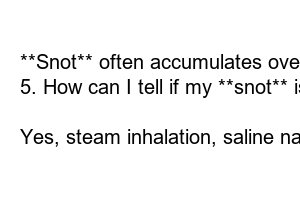코딱지가 자주 생기는 이유
**The Science Behind Why Snot Often Occurs in English**
Have you ever wondered why **snot** seems to constantly be running out of your nose, especially when you have a cold or allergies? It may seem like a never-ending battle, but there is actually a scientific reason behind why **snot** often occurs in English.
**What is **snot** and why does it happen?**
**Snot**, also known as mucus, is a sticky substance produced by the mucous membrane in the nose and sinuses. It serves as a protective barrier against germs, dust, and debris. **Snot** is produced in response to irritation or inflammation in the nasal passages, which can be caused by allergens, viruses, or bacteria.
**Why does **snot** often occur in English?**
In English-speaking countries, the word **snot** is commonly used to describe the substance that comes out of the nose when you have a cold. This could be due to the fact that the English language has a wide range of **vocabulary** to describe bodily functions and fluids.
**How does the body produce **snot**?**
When the mucous membranes in the nasal passages detect an irritant, such as pollen or a virus, they produce more mucus to trap and remove the foreign substance from the body. This excess mucus then drains out of the nose, causing that familiar **snot** drippage.
**What are the benefits of **snot**?**
While **snot** may be annoying, it plays a crucial role in protecting the body from harmful invaders. The sticky texture of **snot** helps to trap bacteria and viruses, preventing them from entering the body and causing infection.
**How can you reduce **snot** production?**
There are several ways to reduce **snot** production, such as staying hydrated, using a humidifier, and avoiding allergens. Over-the-counter decongestants can also help to dry up excess **snot** and provide relief from congestion.
**Summing it up**
In conclusion, **snot** is a natural and important function of the body that helps to protect us from harmful invaders. While it may be unpleasant, it serves an important purpose in keeping us healthy. So the next time you feel that familiar tickle in your nose, remember that your body is just doing its job to keep you safe.
**FAQs**
1. Can **snot** be different colors?
Yes, the color of **snot** can vary depending on the cause of irritation in the nasal passages.
2. Is it normal to have **snot** every day?
Yes, it is normal for the body to produce **snot** on a daily basis to keep the nasal passages moist and clean.
3. Can certain foods increase **snot** production?
Yes, spicy foods and dairy products can sometimes trigger excess **snot** production in some individuals.
4. Why does **snot** often occur in the morning?
**Snot** often accumulates overnight when we are lying down, leading to that familiar stuffy feeling in the morning.
5. How can I tell if my **snot** is a sign of a more serious issue?
If your **snot** is accompanied by other symptoms such as fever, severe congestion, or difficulty breathing, it may be a sign of a more serious issue that requires medical attention.
6. Are there any natural remedies for reducing **snot** production?
Yes, steam inhalation, saline nasal sprays, and herbal teas can all help to reduce **snot** production and provide relief from congestion.

